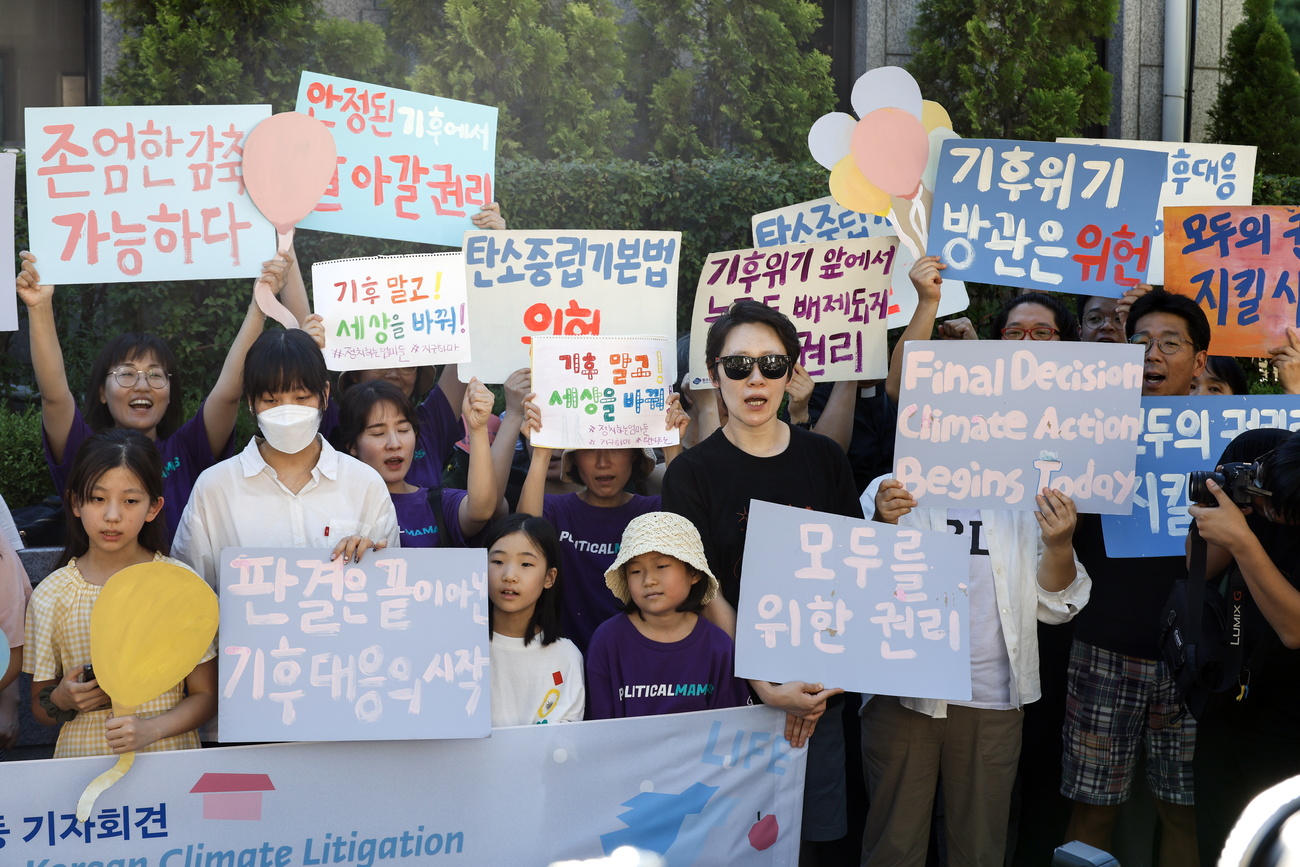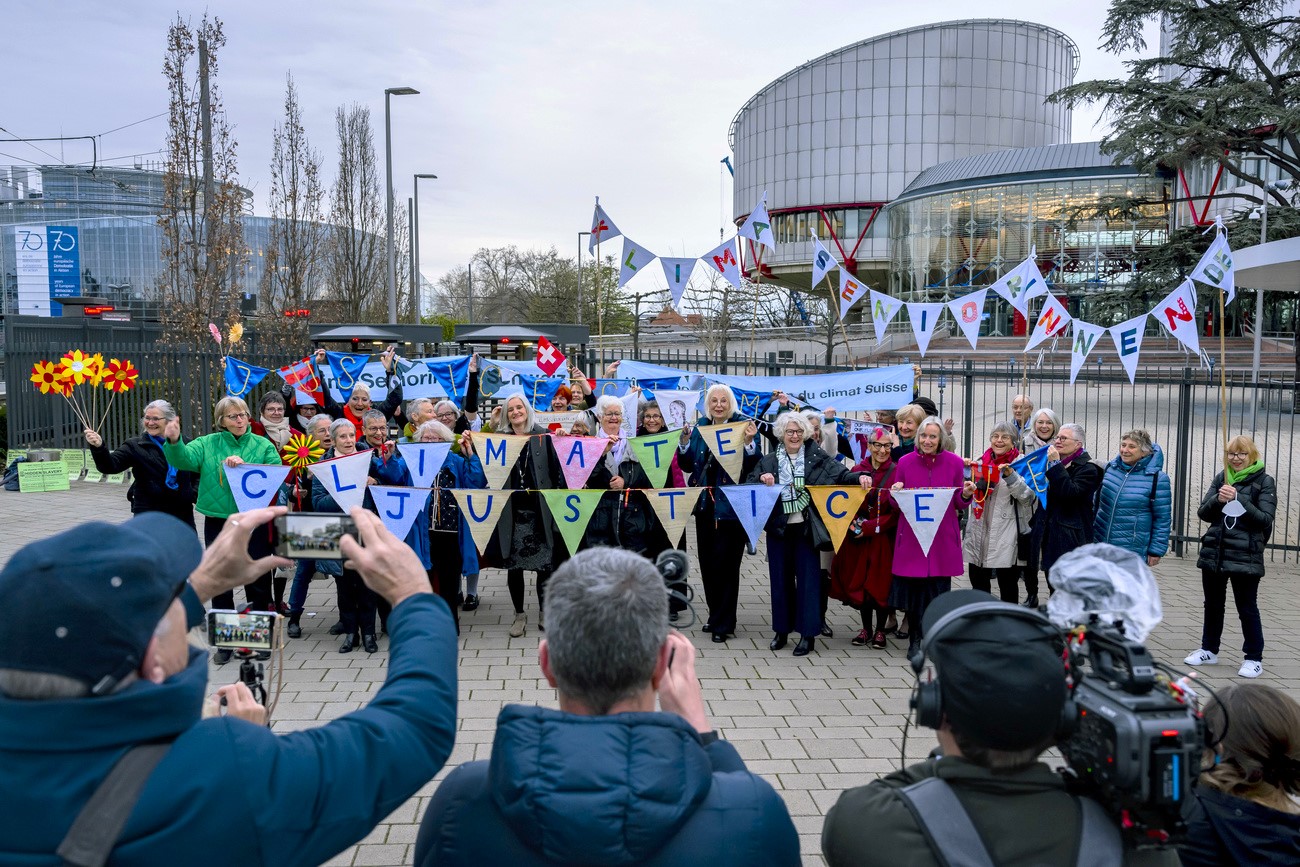
Swiss women’s climate lawsuit reverberates in South Korea

South Korea is one of the world’s leading economies, but its climate policy does not respect human rights. Now, after a historic court victory for the younger generation, older citizens are also demanding more ambitious climate targets. Both cases have a strong connection with Switzerland.
The date of August 29, 2024 will long remain etched in the minds of the crowds of people, among them many youth, who were gathered outside South Korea’s Constitutional Court in Seoul. On that day, the court ruled in a landmark decisionExternal link that the country’s climate change law did not protect the basic rights of future generations.
This success “rode on the global momentum of climate litigation”, says Gwanhaeng Lee, a lawyer at Solutions for Our ClimateExternal link (SFOC), an independent organisation that followed the case closely. “Recent victories in Germany, the Netherlands and Switzerland all laid the foundation for the Korean claim,” he tells SWI swissinfo.ch.
The group Youth 4 Climate Action, which leads the country’s school climate strike movement, filed the first petition in South Korea in 2020. It accused the government of setting insufficient emission-reduction targets, thus violating the fundamental rights of citizens. Three more claims were subsequently filed, bringing the number of plaintiffs to 255.
In its ruling, the Constitutional Court of South Korea – one of the country’s highest judicial bodies – held that part of the country’s carbon neutrality act was unconstitutional. In particular, the lack of legally binding emission-reduction targets for the period 2031–2049 did not protect the rights of younger generations and placed an excessive burden on the future.
The environment ministry said it respected the verdict and would implement follow-up measures, news agency ReutersExternal link reported. The government and the National Assembly now need to revise the act by February 28, 2026.
Meanwhile, the court dismissed the complaint that the government’s goal of cutting emissions by 40% by 2030, compared to 2018 levels, violated constitutional rights.
South Korea aims to achieve climate neutrality, or net-zero emissions, by 2050. The Asian state is among the ten biggest CO2-emitting countries in the worldExternal link.
Ruling follows decision of European court in Swiss case
The South Korean court’s decision is a landmark ruling. It is the first time that a court in Asia has recognised human rights violations linked to climate inaction, according to Lee, the lawyer at SFOC.
The timing was also very helpful, says Sejong Youn, director of the non-profit organization Plan 1.5, one of the claimants’ legal representatives. The European Court of Human Rights (ECHR) in Strasbourg handed down its verdict against Switzerland just before the public hearing of the Korean case.
“We could demonstrate to the Constitutional Court that there is a global trend of courts ruling favourably in cases calling for greater climate action,” says Youn.
On April 9, the ECHR upheld the appeal of the Senior Women for Climate Protection, a Swiss association of over 2,500 women aged 64 and above, and condemned Switzerland for violating human rights in the environmental field. It was the first time that the ECHR found a state guilty of failing to take action against climate change, linking the protection of human rights to compliance with environmental obligations.

More
Landmark ruling: Switzerland’s climate policy violates human rights
Domino effect for climate claims in Asia
In its decision, South Korea’s Constitutional Court also held that the law should include standards to quantify the greenhouse gas reduction target, Youn explains: “This reflects the content of the important ECHR ruling.”
In the case of Switzerland, the ECHR found gaps in the implementation of climate policies as required by the Paris Climate Agreement. These included the Swiss government’s inability to quantify the greenhouse gas emissions the country can still emit to limit global warming to 1.5 °C above pre-industrial levels.
“We hope that the victory in South Korea will soon have a domino effect and trigger further successes across Asia,” says Lee. Similar climate lawsuits are underway in JapanExternal link and TaiwanExternal link.
Climate change litigation is on the rise around the world, and numerous rulings have recognised the responsibility of governments and companies. According to the Grantham Research Institute on Climate Change and the Environment, at least 230 new climate casesExternal link were filed in 2023. They number over 2,600 in total, most of them in the United States.
Older people and climate disasters – like an old zebra facing a lion
The younger generation in South Korea is not the only one to be dissatisfied with their country’s climate policy.
In March this year, 123 people over the age of 50 filed a petitionExternal link accusing the government of adopting insufficient emission-reduction targets. The group, which calls itself 60+ Climate Action, above all criticised the authorities for not coming up with measures to shield the elderly from the risks associated with climate change.
“The government is not protecting the dignity and right to life of older citizens,” said Park Tae-joo, a member of the group. Leaving vulnerable older people to face climate disasters on their own is like “entrusting an old zebra to a lion”, he said in March.

A report by the South Korean environment ministry on the impact of climate change, published in 2020, found that people aged over 65 are the most affected by global warming, the petitioning committee stresses. Older people are at greater risk of dying during heatwaves and suffer the most from health problems caused by pollution and allergies.
Swiss and South Korean groups compare notes
The legal action in South Korea is supported by SFOC and closely linked to the precedent set by Senior Women for Climate Protection in Switzerland. A few months ago, a member of SFOC travelled to Switzerland to meet representatives of the Swiss association to “share ideas and experiences”.
The insights gained were invaluable. The Swiss women explained the difficulty of proving the link between climate change and individual health impacts, stressing the need to present solid scientific data to support the petition, Lee says. “They also talked about the importance of persevering, given the long-drawn-out and complex nature of climate litigation,” he adds.
To back their claim, South Korea’s senior citizens drew on scientific evidence from reports by the Intergovernmental Panel on Climate Change, the World Health Organization and the Korea Disease Control and Prevention Agency.
There is no fundamental research in South Korea on the specific impacts of climate change on vulnerable groups such as older people, notes Lee. “This further strengthened our argument that the government is not doing enough to protect the elderly,” he says.
The group 60+ Climate Action has submitted its petition to the National Human Rights Commission. The text has no legal force, but Lee is hopeful that it will lead to a series of policy recommendations and push the government to implement measures to protect those most vulnerable to the effects of climate change.
Edited by Veronica De Vore. Adapted from Italian by Julia Bassam/gw

In compliance with the JTI standards
More: SWI swissinfo.ch certified by the Journalism Trust Initiative



























You can find an overview of ongoing debates with our journalists here . Please join us!
If you want to start a conversation about a topic raised in this article or want to report factual errors, email us at english@swissinfo.ch.